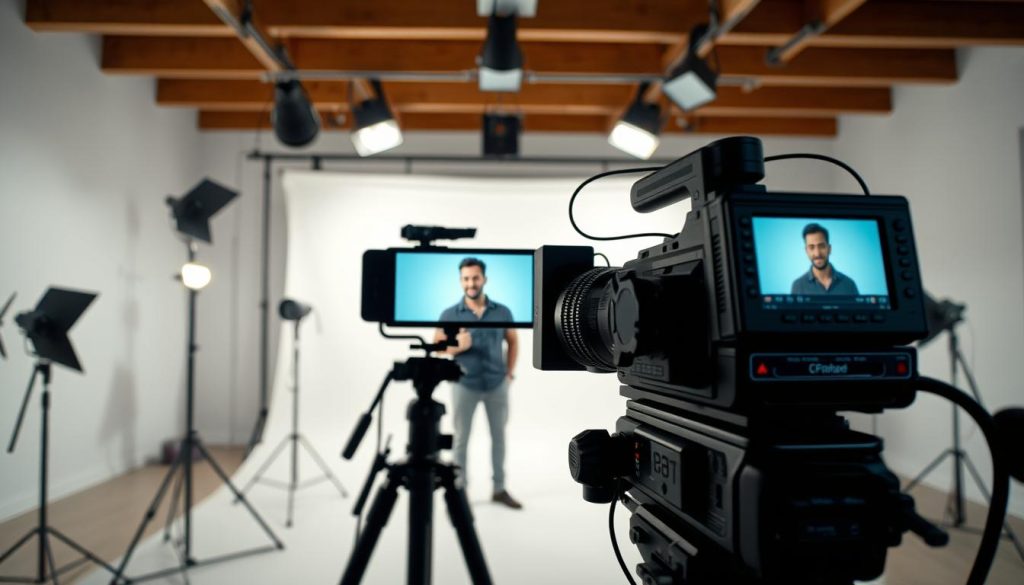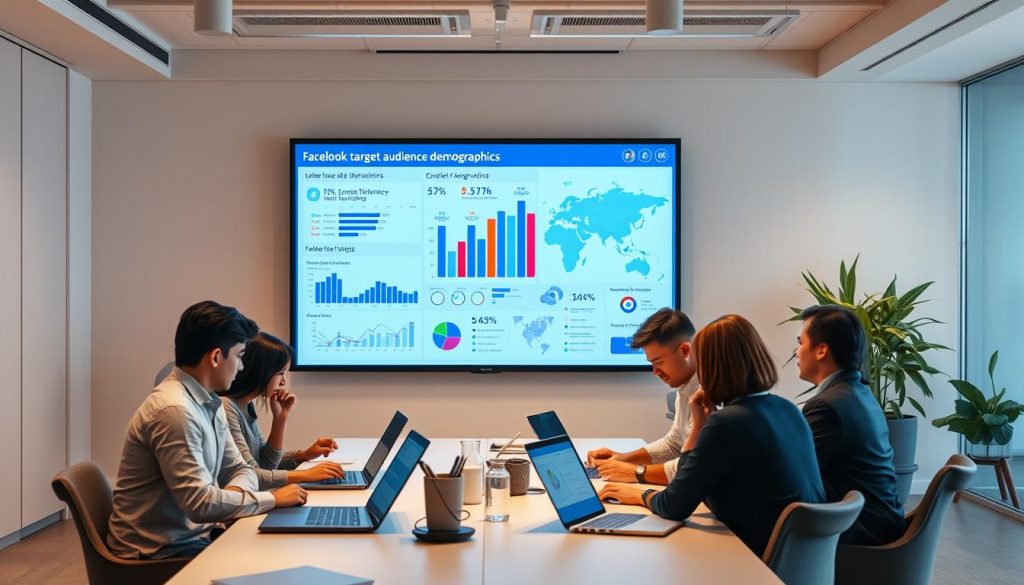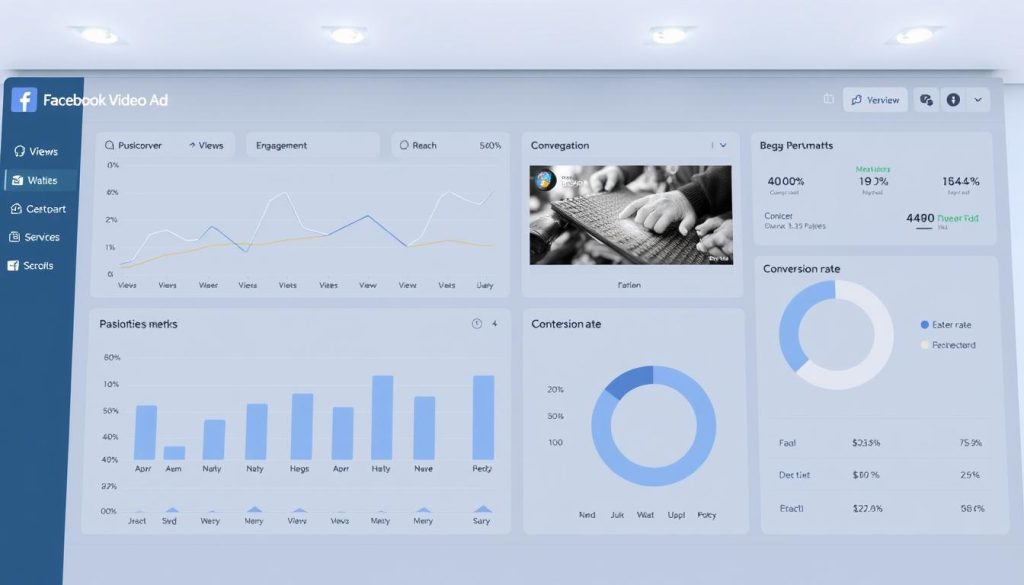We live in a digital age where video marketing has become a crucial element in capturing the attention of potential customers. With Facebook video ads, businesses can now reach their target audience more effectively.
Did you know that videos on Facebook generate up to 8 billion views daily? Moreover, shoppers are 1.81 times more likely to make a purchase after watching a video. This statistic underscores the potential of video ads in driving sales and boosting brand awareness.
By leveraging video for Facebook ads, businesses can stay ahead of the competition and achieve their marketing goals. In this article, we will explore effective strategies for creating successful video ads on Facebook.
Key Takeaways
- Video ads on Facebook can significantly increase brand awareness.
- Shoppers are more likely to make a purchase after watching a video.
- Effective video marketing strategies can drive sales and boost conversions.
- Facebook video ads offer a wide range of targeting options.
- Businesses can measure the success of their video ad campaigns using Facebook’s analytics tools.
Understanding the Importance of Video for Facebook Ads
In the ever-evolving landscape of digital marketing, video content has emerged as a crucial element for capturing user attention on platforms like Facebook. As we navigate the complexities of online advertising, it’s clear that video content is no longer a luxury, but a necessity for businesses aiming to drive results.

The Rise of Video Content in Digital Marketing
The rise of video content in digital marketing has been phenomenal. Facebook, recognizing this trend, created Facebook Watch, a video-on-demand service that now boasts over 1 billion users watching video content every month. This shift towards video is driven by its ability to convey complex information in an engaging and easily digestible format.
We see that video content offers a unique blend of visual and auditory elements that can captivate audiences more effectively than text or image-based content alone. This has significant implications for businesses looking to make an impact on Facebook.
Engagement Metrics: Why Video Wins
When it comes to engagement metrics, video content outperforms other types of content on Facebook. Here are some key reasons why:
- Videos generate higher engagement rates compared to static ads.
- They offer a more immersive experience, leading to better brand recall.
- Video content is more likely to be shared, expanding its reach.
These metrics underscore the importance of incorporating video into your Facebook ad strategy to maximize engagement and ROI.
Facebook’s Algorithm and Video Preference
Facebook’s algorithm favors video content, particularly native videos uploaded directly to the platform. This preference is due to the higher engagement rates and longer watch times associated with native video content. As a result, businesses that utilize native video content are more likely to see their ads perform better in terms of visibility and engagement.
To capitalize on this, we recommend focusing on creating high-quality, engaging video content that resonates with your target audience. By doing so, you can improve your ad performance and achieve your marketing goals more effectively.
Types of Videos That Convert on Facebook
When it comes to driving results with Facebook ads, the type of video content you use can make all the difference. By leveraging the right video format, businesses can capture their audience’s attention, build trust, and drive conversions.
Product Demos: Showcase Your Goods
Product demos are an effective way to showcase your products or services in action. By demonstrating the features and benefits of your offerings, you can help potential customers understand how they can solve their problems or meet their needs.
For instance, a company selling outdoor gear can create a product demo video showcasing the features of their latest tent, such as its waterproof material, easy setup, and spacious interior. This type of video content can help potential customers visualize how the product works and make a more informed purchasing decision.

Customer Testimonials: Build Trust
Customer testimonials are another powerful way to build trust with your target audience. By sharing real-life experiences and success stories from satisfied customers, businesses can establish credibility and demonstrate the value of their products or services.
“The best marketing doesn’t feel like marketing.”
Customer testimonials can take many forms, including video reviews, case studies, and user-generated content. By showcasing the positive experiences of their customers, businesses can create a sense of social proof and increase the likelihood of conversion.
Storytelling: Connect with Your Audience
Storytelling is a highly effective way to connect with your audience on an emotional level. By sharing compelling stories that resonate with their values, interests, or pain points, businesses can create a deeper connection with their target audience.
For example, a company selling eco-friendly products can create a video that tells the story of how their products are made, highlighting their commitment to sustainability and reducing waste. This type of storytelling can help businesses build a loyal community of customers who share their values.
| Video Type | Purpose | Benefits |
|---|---|---|
| Product Demos | Showcase products or services | Helps customers understand product features and benefits |
| Customer Testimonials | Build trust and credibility | Establishes social proof and increases conversions |
| Storytelling | Connect with audience emotionally | Creates a deeper connection and builds brand loyalty |
Crafting Engaging Video Content
To drive results with Facebook Ads, businesses must focus on creating captivating video content. Engaging videos not only grab users’ attention but also drive desired actions, making them a crucial component of a successful advertising strategy.
Hooking Viewers: The First Few Seconds Matter
The first few seconds of your video are critical in capturing viewers’ attention. Capturing attention in the first 2 seconds is crucial, as it determines whether the viewer will continue watching or scroll away. To hook viewers, use an interesting narrative, visually appealing graphics, or an unexpected statement that piques their curiosity.
Some effective ways to capture attention include:
- Using bold, eye-catching visuals
- Asking a thought-provoking question
- Creating an intriguing scenario
- Introducing an interesting character or personality
Clear Call-to-Action: Driving Action
A clear call-to-action (CTA) is essential in driving the desired action from your viewers. A well-crafted CTA tells the viewer what to do next, whether it’s visiting your website, signing up for a newsletter, or making a purchase. To create an effective CTA, make sure it is:
- Clear and concise
- Prominently displayed
- Relevant to the content
- Action-oriented
For more insights on creating effective CTAs, check out our resources on content marketing.
Optimal Video Length: Best Practices
The length of your video can significantly impact its effectiveness. While there’s no one-size-fits-all answer, research suggests that shorter videos tend to perform better. Keep your videos concise and to the point, focusing on the key message you want to convey.
Some general guidelines for video length include:
| Video Type | Recommended Length |
|---|---|
| Explainer videos | 60-90 seconds |
| Product demos | 2-3 minutes |
| Testimonials | 1-2 minutes |
Budgeting for Video Production
To maximize ROI on Facebook video ads, understanding budget allocation is key. Creating effective video ads requires a clear understanding of the costs involved in video production.
DIY vs. Professional Production
When it comes to video production, businesses have two primary options: DIY production or hiring professional video production services. While DIY production can be cost-effective, it may lack the polish and professionalism that a dedicated production team can provide.
On the other hand, professional production services can offer high-quality visuals and a more engaging narrative, but at a higher cost. We must weigh the benefits of each approach against our budget and campaign goals.

Allocating a Budget for Ads
The cost of video ads on Facebook depends largely on our ad budget. Facebook will attempt to deliver as many results as possible within that budget. Therefore, it’s crucial to allocate a sufficient budget to achieve our desired outcomes.
When allocating a budget, we should consider factors such as target audience size, ad competition, and the complexity of our ad campaign. A well-planned budget will help us achieve a better ROI on our video ads.
Measuring ROI on Video Ads
To determine the effectiveness of our video ad campaign, we need to measure its ROI. This involves tracking key performance indicators (KPIs) such as view-through rates, click-through rates, and conversion rates.
By analyzing these metrics, we can refine our ad campaign, making data-driven decisions to optimize our budget allocation and improve overall performance. Regular monitoring and adjustment are essential to maximizing ROI on our video ads.
Tips for Video Optimization on Facebook
Effective video optimization on Facebook can significantly boost your ad performance and overall campaign success. To achieve this, we need to focus on several key areas that can make a substantial difference in how your content is received and engaged with by your target audience.
Using Captions for Accessibility
Adding captions to your videos is no longer just a best practice; it’s a necessity. With 85% of Facebook videos being watched without sound, captions ensure that your message is conveyed effectively, regardless of whether the viewer has the sound on or off. Captions also improve accessibility for viewers who are deaf or hard of hearing, expanding your content’s reach.
Best Practices for Thumbnails
The thumbnail of your video is the first thing potential viewers see, making it a critical component of your video’s success. To create an effective thumbnail, ensure it is eye-catching and relevant to the content. Use bright colors and clear images that can stand out in a crowded newsfeed. Additionally, consider using text overlays to highlight key messages or calls-to-action.

Video Format Specifications
Facebook has specific guidelines for video formats to ensure optimal playback and user experience. To comply with these guidelines, we recommend using MP4 or MOV file formats, as they are widely supported and offer high-quality video. Additionally, consider the aspect ratio; Facebook supports a variety of ratios, but square (1:1) and vertical (4:5 or 9:16) videos tend to perform well, especially for mobile users.
Here’s a summary of key video specifications for Facebook:
| Specification | Recommended Setting | Details |
|---|---|---|
| File Format | MP4 or MOV | Widely supported formats |
| Aspect Ratio | 1:1, 4:5, or 9:16 | Square and vertical videos perform well |
| Resolution | At least 720p | Higher resolution for better quality |
By following these tips and specifications, we can significantly enhance the performance of our video ads on Facebook, improving both engagement and conversion rates.
Targeting Your Audience Effectively
Targeting your audience effectively is what separates good video ad campaigns from great ones on Facebook. To achieve the best results with your video for Facebook ads, understanding who your audience is and how they interact with your content is crucial.
We know that creating detailed buyer personas can significantly guide your ad content and messaging, making your social media video more relatable and engaging to your target audience.
Custom Audiences: Retargeting Strategies
One of the most effective ways to target your audience is by using Custom Audiences. This feature allows you to retarget users who have already interacted with your brand, either by visiting your website, engaging with your content on Facebook, or being part of your customer list.
By leveraging Custom Audiences, you can create highly targeted ads that are more likely to convert because they are directed at people who have already shown interest in your products or services.
Audience Insights: Understanding Demographics
Facebook’s Audience Insights tool is a powerful resource for understanding your target demographics. It provides valuable data on age, gender, location, and interests, helping you refine your targeting to reach the most relevant audience for your video for Facebook ads.
With Audience Insights, we can gain a deeper understanding of our audience’s behaviors and preferences, enabling us to tailor our content to better resonate with them.

A/B Testing Different Segments
A/B testing is a critical strategy for optimizing your video ad performance. By creating different versions of your ads and testing them against various audience segments, you can identify which elements resonate best with your target audience.
This process involves testing variables such as ad creative, messaging, and targeting options to determine the most effective combinations. Through A/B testing, we can continually refine our approach to targeting, ensuring that our social media video campaigns achieve the highest possible ROI.
As emphasized by a leading marketing expert, “The future of advertising is not about reaching the most people, but about reaching the right people effectively.” Effective targeting is not just about numbers; it’s about relevance and engagement.
“The future of advertising is not about reaching the most people, but about reaching the right people effectively.”
Analyzing Performance Metrics
To maximize ROI on Facebook video ads, analyzing performance metrics is crucial. We need to understand how our video marketing efforts are performing to make informed decisions.
By regularly reviewing performance data, we can identify areas of improvement and optimize our ad campaigns for better results. This involves looking at various metrics that indicate the success of our video ads.
Key Performance Indicators for Video Ads
When it comes to video ads on Facebook, there are several key performance indicators (KPIs) that we should focus on. These include:
- View-through rate (VTR): The percentage of people who viewed your ad after seeing it.
- Click-through rate (CTR): The percentage of people who clicked on your ad after viewing it.
- Conversion rate: The percentage of people who completed a desired action after clicking on your ad.
- Cost per view (CPV): The cost of each view of your ad.
- Return on ad spend (ROAS): The revenue generated by your ad campaign compared to its cost.
By monitoring these KPIs, we can gain insights into how our video ads are performing and make data-driven decisions to improve their effectiveness.
Tools for Tracking and Analyzing Data
To analyze performance metrics effectively, we need the right tools. Facebook provides several tools to help us track and analyze our video ad performance, including:
- Facebook Ads Manager: A comprehensive tool for managing and analyzing ad campaigns.
- Facebook Insights: Provides detailed insights into ad performance, including metrics like reach, engagement, and conversions.
- Third-party analytics tools: Tools like Google Analytics and Hootsuite can provide additional insights and help us track our video ad performance across multiple platforms.
By leveraging these tools, we can gain a deeper understanding of our video ad performance and make informed decisions to optimize our campaigns.

Iterating Based on Performance Insights
Analyzing performance metrics is not a one-time task; it’s an ongoing process. We need to regularly review our data, identify areas for improvement, and make adjustments to our ad campaigns accordingly.
This might involve tweaking our targeting options, adjusting our ad creative, or allocating more budget to top-performing ads. By continuously iterating based on performance insights, we can optimize our video ad campaigns for maximum ROI.
Key Takeaways:
- Regularly review performance metrics to optimize video ad campaigns.
- Focus on key performance indicators like VTR, CTR, conversion rate, CPV, and ROAS.
- Leverage tools like Facebook Ads Manager and third-party analytics tools to track and analyze performance data.
Trends in Video Advertising
The world of video advertising is witnessing a paradigm shift, with short-form videos, live streaming, and interactive content leading the charge. As technology continues to evolve, businesses must adapt to these changes to remain competitive.
“The future of advertising is all about creating immersive experiences that captivate audiences,” says a leading marketing expert. This shift is driven by consumer demand for more engaging and personalized content.
Short-Form Video: The Rise of Reels
Short-form videos, popularized by platforms like TikTok and Instagram Reels, have become a staple in digital marketing strategies. These bite-sized videos are designed to capture attention quickly, making them ideal for today’s fast-paced digital landscape.
We see a significant opportunity in leveraging short-form videos to boost engagement. By creating concise, compelling content, businesses can effectively reach their target audience.
Live Video: Engaging Audiences in Real-Time
Live video has emerged as a powerful tool for real-time engagement. It allows brands to connect with their audience in a more authentic and immediate way, fostering a sense of community and loyalty.
Using live video, companies can host product launches, behind-the-scenes tours, or Q&A sessions, creating a dynamic and interactive experience for viewers.
Interactive Video Content: What to Expect
Interactive video content is on the rise, offering viewers a more immersive experience. By incorporating elements like quizzes, polls, and clickable hotspots, businesses can increase engagement and gather valuable insights.
As technology advances, we can expect to see even more sophisticated forms of interactive video content, further enhancing the viewer experience and driving better results for advertisers.
By staying informed about these trends, businesses can leverage new opportunities to engage their audience and stay ahead of the competition in the ever-evolving landscape of video advertising and digital video campaigns.
Conclusion: Implementing Strategies for Success
By defining clear goals, knowing the target audience, and leveraging data, businesses can amplify their business development efforts and achieve remarkable results. A video-first content marketing approach has proven to drive significant organic views and boost gross profit.
We can leverage video content creation to enhance online video promotion and maximize ROI. Effective video advertising strategies can lead to substantial savings in ad spend while increasing revenue.
Effective Video Campaigns
To start a successful video campaign, focus on crafting engaging video content that resonates with your audience. Utilize product demos, customer testimonials, and storytelling techniques to drive action.
Future-Proofing Your Strategy
Stay ahead of the curve by embracing the latest trends in video advertising, such as short-form video and live streaming. Continuously monitor performance metrics and adjust your strategy to optimize results.
Ongoing Learning
For ongoing learning and improvement, explore resources that can help you refine your video marketing strategy and stay up-to-date with the latest best practices in video content creation and online video promotion.
